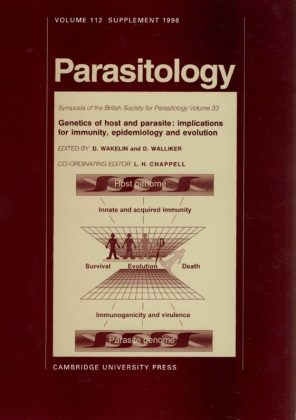Meet the Editor: Q&A with Lisa Ranford-Cartwright, University of Glasgow
Welcome to our “Meet the Editors” series, where we interview the editorial team about their work and their relationship to the journal. In this post we meet Dr Lisa Ranford-Cartwright, Editor for Parasitology

What is your current job title both within Parasitology and outside of the journal? Where are you based in the world?
I became one of the Editors of Parasitology in Autumn 2020. I live in Scotland in the United Kingdom, and I am a Research Group leader and Reader at the University of Glasgow, in the Institute of Biodiversity, Animal Health and Comparative Medicine, College of Medical, Veterinary and Life Sciences.

In a few sentences, please describe the focus of your work. Which parasites do you study? What is the goal of your research? What approaches do you use in your work?
I am a geneticist working with the human malaria parasite Plasmodium falciparum. The primary aim of my research is to understand the effect of parasite genetic polymorphism on parasite phenotypic variation, particularly in transmission biology, parasite-vector interactions and parasite growth rate in the human host. My laboratory maintains many different lines of human malaria parasites in culture, as well as four different species of Anopheles mosquitoes in insectaries. We combine laboratory experimental work with fieldwork in a number of malaria-endemic countries, with the aim of applying the information on genetic differences between parasites, gained from our experimental work, to develop new tests to predict disease severity in people, or the likelihood of mosquito transmission. I have also worked collaboratively with colleagues in Europe and in malaria-endemic countries in Africa, SE Asia and South America, to monitor antimalarial drug resistance using molecular markers, to examine population genetics of malaria parasites, and to investigate mosquito transmission of parasites with genetically modified genes such as those involved in cell cycle control. More recently, I have become involved in a project on Onchocerca, using genetic approaches similar to those used in malaria to examine the genetic similarity of parasites within and between infections in populations.
When did you first become interested in parasitology as a field? Did a particular teacher or mentor direct your career path?
I got hooked on parasites in my final year as an undergraduate. The degrees at University of Cambridge allow a lot of flexibility and breadth, so while I originally intended to study genetics, I ended up studying pathology in my final year, which included parasitology. My final year project was on Trypanosome genetics, supervised by Jerry Wells and Richard Le Page. When I was looking for a PhD in a similar area – combining my interest in genetics and parasitology – Jerry pointed me towards David Walliker at the University of Edinburgh, who had been his PhD examiner. I was supervised there by David and by Richard Carter, both of whom were enormously influential on my development as a scientist, parasitologist and geneticist. Parasitology is a relatively small and friendly field, which has the advantage that everybody knows everybody else, and there are many connections between the subdisciplines.

How did you first become familiar with Parasitology?
Parasitology was an important specialist journal when I was a PhD student (and still is). I published the main findings of my PhD in the journal in 1993 and have continued to publish there throughout my career. David Walliker edited a special issue in 1996 for which I designed the cover, which is quite an achievement for someone with no artistic talents!
What motivated you to become an editor at Parasitology?
I joined the University of Glasgow in 2000 where my Head of Department was Prof. Stephen Phillips, the previous Editor-in-Chief of Parasitology. He frequently invited me to review papers for the journal. I was a member of the wider Editorial Board from 2011 to 2015. In 2020, Russell Stothard asked me if I would be interested in becoming an Editor. More connections coming up: I already knew another editor, Jonathan Wastling, with whom I had shared an office when I joined the University of Glasgow, and I had been External Examiner for an undergraduate degree at the Liverpool School of Tropical Medicine where Russell was the course leader. I knew therefore that it would be a personally fun but scientifically rigorous experience, and I was motivated by the desire to give something back to the field that has been my home for thirty years.
What is the best part of editing for Parasitology?
It’s a pleasure to interact with the other editors and the production staff at Parasitology, and to learn about the whole process of a journal – from submission to publication. Although due to the Coronavirus restrictions these meetings have all been online to date, I am looking forward to meeting them in person soon. On a personal level, reading the new submissions allocated to me has expanded my knowledge of parasitology – I don’t just handle submitted articles on malaria. I can remember the excitement of receiving the referee’s comments on my first papers, and then seeing my paper in press for the first time, so I know how important this first step is for a scientist’s career. Being an editor also means I get to read a lot of constructive criticisms from the reviewers, which help me to improve my own papers. The worst part of being an editor is rejecting a paper, especially for an early career researcher, so I try to do this in a constructive way.
Do you have any advice for those submitting to Parasitology?
I think most of the editors have given the same advice: read the instructions! The journal does publish a very wide range of Parasitology topics, so it is rare that your paper will not be within the scope of the journal. However, that breadth means many of the readers of your article may not be experts in your parasite, so useful tips are to make sure you explain why the research is important, and clearly identify the “take home message”. The easiest papers to review are those that have a clear structure – like a good book, with a beginning, a middle and an end – and that are carefully proof-read before submission. While the reviewers are looking for the scientific quality, there is no doubt that they are better-disposed to a well written paper than one littered with typographical errors and ambiguities!
What advice would you give to early career researchers who are just starting out in parasitology as a field?
The advice for ECR in parasitology will be similar for any ECR in science, but there are some extra considerations (and benefits). Many (human) parasite infections are diseases of poverty and exist in resource-poor environments. If you don’t live in a country endemic for that disease, visiting and working with people directly affected by the parasite you study will give you better insights, and focus your research on important questions. Parasites are biologically fascinating in their own right, but your research can also have a direct impact in improving treatment and control of disease. Parasitology is a relatively small field, so you’ll find most people attend the same conferences and meetings. If you can, attend conferences, present your work, and take advantage of the opportunity to get to know others in your field.
More generally, be confident in your own abilities, acknowledge that not every experiment will work, and develop resilience for those times when nothing goes according to plan. Beware of “imposter syndrome”: everybody has had grants rejected, got bad reviews for submitted papers, not got jobs they applied for. Take advantage of any mentoring opportunities offered to you for career advice and strategic input, remembering that a mentor isn’t a “magic wand”. Develop a supportive network of your peers early on – these people will be your future collaborators, as well as some of your best friends. And finally, while it is not easy early in your career, when there is huge pressure to produce results, write papers, and get fellowships or jobs, do try to maintain some semblance of a work-life balance.
Parasitology is an important specialist journal covering the latest advances in the subject. It publishes original research and review papers on all aspects of parasitology and host-parasite relationships, including the latest discoveries in parasite biochemistry, molecular biology and genetics, ecology and epidemiology in the context of the biological, medical and veterinary sciences.







